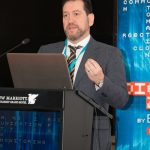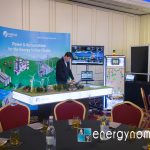On February 18, over 20 speakers and more than 250 participants in the audience, constituted the largest conference so far this year, dedicated to the digitization of the Romanian economy and society – DigitALL 2020, organized by Energynomics. Experts from energy, IT, finance and telecom have described the current situation and the trends of digitization, the opportunities and risks brought before us by the expansion of the digital world.
- abin Sărmaș, Autoritatea pentru Digitalizarea României
- Yugo Neumorni, president of CIO Council Romania
- Sebastian Ferecuș, Emerson Automation Solutions
- Cosmin Ghiță, Distribuție Oltenia (CEZ România)
- Alcino Beirao, Industry Solutions Architect at Emerson Automation Solutions
- Andrei Berechet, ADREM
- Cristian Kameniczki, CIO Hidroelectrica
- Cristian Pîrvulescu, ENEVO Group
- Gabriel Avăcăriței, Energynomics
- Vladimir Dincu, UiPath
- Adrian Boiarciuc, CIO Romgaz
- Daniel Apostol, Federația Patronală Petrol și Gaze – FPPG
Opening the conference, the president of the Authority for the Digitization of Romania Sabin Sărmaș presented the priorities of the institution new born at the end of February: the digital transformation of Romania, “both in the public sector and by supporting the private sector “. Sabin Sărmaș introduced himself as open to dialogue with industry, non-governmental organizations and the academia, up to even support the implementation of specific legislative proposals meant to help digital transformation through standardization, for example.
Digital automation is inevitable
Digital automation is driven by large corporations, solution providers and their customers alike. The process can be accelerated when it is supported by public authorities (the example of Estonia) or slowed down by outdated or unclear national legislation; however, it is inevitable because it is required by each of us and is based on increasingly cheaper and thus more accessible technologies. “The technologies are advancing and everyone will be able to buy such equipment, as prices fall,” said Cosmin Ghiță, responsible for the Smart Transformation program within Distribuție Oltenia, part of the CEZ Group in Romania. As a top level global vendor, Emerson Automation Solutions works with most of the large energy companies and in other industries, as well, said Sebastian Ferecuș, CSEE General Manager, Emerson Automation Solutions. “What the new digital transformation, or industry 4.0, or the industrial internet of things (IIoT) brought are new technologies for sensors, and I mean wireless technology,” he said.
- Augustin Ionescu, Siemens România
- Mircea Modran, CIO Electrica
- George Ilie, Manager Smart City Department B2B, Telekom
- Johan Gabriels, Country Manager România Ebury
- Marian Răducu, CIO Transelectrica
- Andrei Berechet, Business Development Director Adrem
“Digitization is primarily about the smart capture and utilization of data. More than 50% of the data were created during the last two years, but less than 1% were analyzed and used. There is room for improvement, in this respect” said Augustin Ionescu, Head of Digital Grid Smart Infrastructure, Siemens Romania.All the energy companies represented at the DigitALL 2020 conference – among which Romgaz, Hidroelectrica, Electrica, Transelectrica, CEZ Romania, MET Romania, Adrem – are in the process of adopting new digital technologies. Just as an example, CEZ will invest 60 million euros in new technologies by 2024, said Cosmin Ghiță.
Hard to build an industry 4.0 when working with a government 2.0
One of the obstacles that companies in the oil and gas industry face jumps up from the legislative realm. One by one, and altogether through the Employers Federation of the Oil and Gas Industry – FPPG, the companies are trying to set the tone of some legislative updates to adapt it to the trends of the moment as they are already accepted in the European documents. A concrete example is the application of the European Regulation 1807/2018 on the free movement of non-personal data on the European territory. At the local level, however, GD 858/2002 limits the circulation of classified information exclusively on the territory of Romania, and “this fact stops us from using cloud or artificial intelligence technologies”, said Adrian Boiarciuc, CIO Romgaz. A FPPG analysis shows that the implementation of cloud and high power computing solutions in the Upstream sector could shorten the time needed for data processing up to 100 times, with a direct impact on international competitiveness and the continuity of the sector in Romania.
- Cristian Oprea, General Investigations
- Ionuț Encescu, Head of Customer Value First Bank
- Bogdan Cornigeanu, Chief Operating Officer, MET România Energy
- Radu Brașoveanu, Executive Technical Director, ENEVO Group
- Mihail Cazacu, Public Affairs Director ANIS
From another perspective, Yugo Neumorni, the president of the CIO Council, referred to the fact that absolutely all the public procurement of the public companies in the critical infrastructure segment are posted in the SEAP system, including all the details that allow the basic elements of the information systems of these companies to be open to all interested. “Transparency is must, no doubt, yet another method has to be found when we talk about critical infrastructure equipment,” insisted Yugo Neumorni.
The energy sector, just like other critical sectors in Romania, is lagging behind with investments, he noted, but consistent efforts must be made to invest not only in the existing infrastructure – for development and modernization – but also in the cyber security areas.
With all the benefits, new categories of risks emerge
Digital transformation comes with important advantages, expressed mainly in the significant improvement of the operational performances. A Gartner study, invoked by Vladimir Dîncu, Business Development Executive at UiPath Romania, anticipates that by 2024, organizations will lower operational costs by 30% by combining hyperautomation technologies with redesigned operational processes.
At the same time, the digitization and circulation of data online expose organizations to new risks, many of them hidden to the vast majority of people who generate, use, transfer and manage information at work and at home. Not only vulnerabilities of (old) equipment yet in operation, but also vulnerabilities inherent to outdated PC software, and to the inappropriate behavior of employees – all these represent major risks, potential threats that can be addressed in part by dedicated IT solutions (Cristian Pîrvulescu and Radu Brașoveanu presented in detail an application developed by ENEVO Group), in part by educating the employees to adopt a so-called “information hygiene”. At the same time, as more and more decisions are made remotely, before or even without physical contact between business partners or between employers and employees, there is a need for new types of verification and control services, noted Cristian Oprea, director at General Investigations.
A new chance for the Romanian economy
For historical reasons, Romania has little chance of growing to be one of the big global economies, by using the specific elements of the industry 2.0 (dominated by the use of electricity and mass production lines) or industry 3.0 (dominated by the impact of electronics – transistors, integrated circuit chips – and automation). Industry 4.0, with its focus on data processing and de-localization, poses fewer obstacles against Romanian (new) players to become relevant globally, and not only at home. An idea and a PC could be enough for launching a successful business, and the Romanian education system still generates each year a number of specialists capable of generating fruitful solutions – as proved by several dozen start-ups that have already found their place in the market in the last decade or so.
We must be careful, however, that “without a functional system of incubation of new ideas it is difficult to grow in a market working under ‘the lowest price’ policy”, stressed Cristian Pîrvulescu (ENEVO Group): “The lowest price means the cheapest equipment and services closest to none. In such conditions, you cannot have technological development, as it is by definition both expensive and risky; even more so, some ideas, as they appear and are pursued at the limits of creativity, will surely develop into failure, and this is a perfectly legitimate result of technological research and development”. For his part, Andrei Berechet, Business Development Director at Adrem, insisted on the need of using in Romania the intellectual property created by the Romanian IT sector; at turn, Cristian Kameniczki, manager of the IT&C department of Hidroelectrica, mentioned the importance of a closer collaboration between companies, academia and the solution providers.
Flexibility and openness to partnerships
“I do not expect an energy company to significantly enter in the area of financial services – or the other way around,” said Mircea Modran, CIO of Electrica SA, just as fintech companies did not replace the traditional big banks, but they occupied the niches not covered by the former, and are now working side by side with them, as explained by Johan Gabriels, Country Manager Romania Ebury. What will happen – and this is already visible – is that there will be a growing appetite for partnerships across domains until recently clearly delimited, such as energy, finance, telecommunications and information technology. “Our companies, coming from different fields, have complementary information on customers and we can work together to intelligently combine this information so that we can help customers make better decisions, more relevant for them,” said Ionuț Encescu, Head of Customer Value la First Bank.
In addition to being a simple energy supplier, we have already evolved to provide customers with artificial intelligence solutions for “internal processes, the procurement of electricity and natural gas included”, said Bogdan Cornigeanu, Chief Operating Officer, with MET Romania Energy. “We are very interested in the energy field,” said George Ilie, manager of the Smart City B2B department, within Telekom. “I’m talking about the ESCO services segment, I’m talking about charging stations for electric cars and about many other projects in this area where electronic communications technology meets energy,” he explained.
Moderator of one of the dialogue sessions, Mihail Cazacu, director of Public Affairs of the Employers Association of the Software and Services Industry (ANIS), referred to the beneficial impact new efficient technologies brings also to the less well off: “Once the technology reaches the most disadvantaged areas of the country, it also brings with it the savings made possible by means of accessing the technology. Technology reduces costs for everyone, but the impact is more relevant to the people for whom each penny matters.”
We are all sailing the same boat – rich and poor, big companies and one-person businesses, public institutions and society as a whole, with all its components – exposed to the same risks and part of the same vulnerabilities; at the same time we are also the immediate or later time beneficiaries of the same benefits. Beyond the work of the engineers, a general effort for information and education is needed for flexible, secure and advantageous long-term partnerships at all levels.
DigitALL 2020 was organized by Energynomics, in partnership with reputed organizations such as the CIO Council, ANIS, the Romanian-German Chamber of Commerce and Industry, BusinessMark, the British Romanian Chamber of Commerce and with the support of our partners: General Investigations, First Bank, MET Romania Energy, Siemens Romania, Emerson Automation Solutions, Ebury, ENEVO Group, Prestigio.
Over 200 people from organizations such as ADITBI, Adrem, Agenția de Consultanță pentru Dezvoltarea Afacerilor, Asimouth Training, ASRO – Organismul Național de Standardizare din România, Barrels Hub Inc, BCR România, Business France, certSIGN, CEZ România, CIO Council, Distribuție Oltenia, ELCEN, Emerson Automation Solutions, EY, FPPG, General Investigation, INCIR, Investisia Group, KeysFin SRL, MET România Energy, MVM Energy, Primăria București, Siemens România, SNSPA, Spitalul “Marie Curie”, Transelectrica, Univ. Petrol Gaze Ploiești, Universitatea Politehnica București – Facultatea de Energetică, Universitatea Tehnică de Construcții Bucuresti were present in the audience.
Energynomics will continue to present on its website some of the ideas presented during the DigitALL 2020 conference and we already announce the next edition: DigitALL 2021! We will have, on February 28, 2021, four panel discussions, four hand-on approach presentations and 3 keynote speakers.




















































